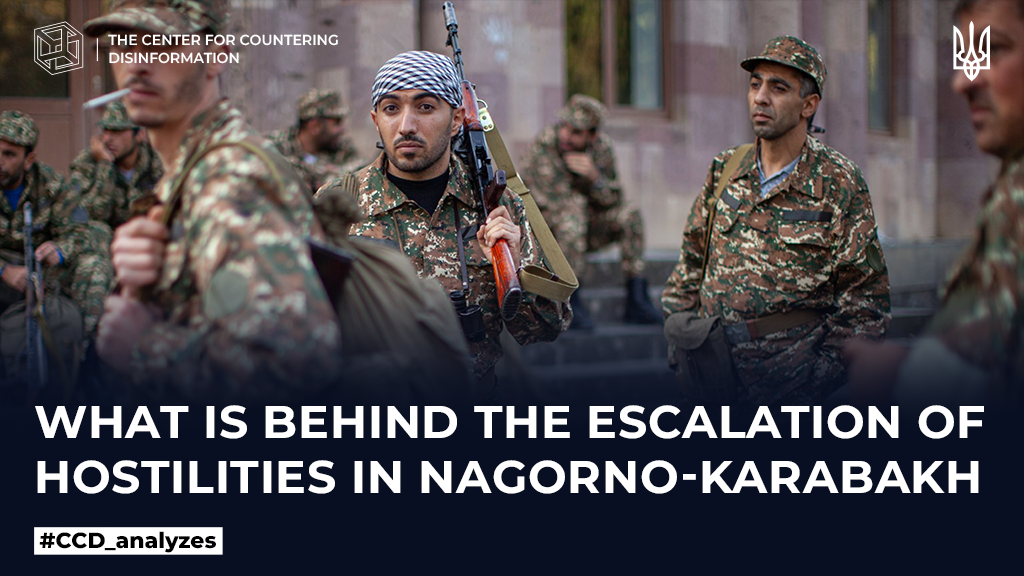On September 19, Azerbaijan announced the launch of local anti-terrorist measures in Nagorno-Karabakh. According to a statement by the country’s Defense Ministry, the purpose of these measures is to ensure the safety of Azerbaijani servicemen and restore the constitutional order of the Republic of Azerbaijan in the region. The Azerbaijani armed forces began shelling almost the entire territory of Nagorno-Karabakh, as well as an operation to break through the Nagorno-Karabakh contact line and take control of its settlements. The Azerbaijani Foreign Ministry stated that the only way to peace in the region is the complete withdrawal of the Armenian armed forces from Karabakh and the dissolution of the regime in Stepanakert, and threatened a full-scale ground operation if these conditions are not met. Armenian Prime Minister N. Pashinyan regarded Azerbaijan’s ground operation as an ethnic cleansing of the Armenians of Nagorno-Karabakh.
The new escalation in Karabakh was generally predictable. After all, Azerbaijan insists that the self-proclaimed Nagorno-Karabakh Republic (NKR, Armenians prefer the name “Artsakh”) is its territory, while Yerevan does not officially recognize Karabakh’s independence, although it maintains close ties with its leadership (Armenians make up three-quarters of the population in Karabakh). Exacerbations such as the current one have occurred regularly since 1988, including two hot phases – First Karabakh War (1992-94) and the Second Karabakh War (2020), which ended in a ceasefire. According to rough estimates, about 32,000 people died on both sides as a result of the two wars, and thousands are missing.
What is behind the current escalation of the situation in Karabakh?
First, everything suggests that this is an artificial escalation of the conflict – as the kremlin’s response to Yerevan’s pro-American position, agreed with the Azerbaijani authorities, and as a pretext for the removal of Pashinyan from office. No wonder russia, which considers itself the main mediator in the negotiations on the settlement of the conflict in Karabakh, supports Azerbaijan with weapons and is not currently considering the protection of Armenia within the framework of the Collective Security Treaty Organization under the pretext that the CSTO guarantees Armenia’s protection only in case of external aggression, and the russian peacekeeping contingent stationed in Karabakh does not interfere in the situation. At the same time, paid pro-russian activists are being bused to Yerevan to try to carry out a coup d’état in the country. On the other hand, Armenian right-wing radical circles accuse russia of provoking a military operation and demand decisive action from the Prime Minister.
Thus, the resumption of a large-scale armed conflict once again demonstrates moscow’s destructive influence on the countries of the region and its failure to fulfill its “peacekeeping” obligations. This may push Armenia to withdraw from the CSTO and demand the withdrawal of the russian military base and peacekeeping contingent. In this regard, the option of transferring hostilities to the territory of Armenia is possible.
Secondly, Turkey, which has been interfering in the Armenian-Azerbaijani conflict since the early 1990s, has once again demonstrated its readiness to actually support Baku in order to replace russia as Azerbaijan’s main partner. Against the backdrop of outwardly tolerable relations with moscow, Ankara is actively waging hybrid wars against russia’s allies in the Middle East, Asia and Africa. In particular, by supporting one side of the conflict, Turkey is trying to ensure the security of the Baku-Ceyhan oil pipeline and the South Caucasus gas pipeline from Azerbaijan as an alternative to gas supplies from russia. The Turkish authorities also expect to make Karabakh a bargaining chip in a big bargain with russia over northern Syria and Libya, where the two countries have turned from partners to rivals over the past two years, which almost led them to war. Currently, President Erdogan’s adviser has said that Ankara does not yet see the need to send troops to Karabakh. However, according to Armenia, in order to support its interests, Turkey deployed its “proxies” from Syria’s Idlib to Karabakh and provided Baku with attack drones that could hit the enemy’s air defense system and other targets. Therefore, even if the Karabakh conflict is “frozen,” Turkey will continue to influence Baku.
So far, the authorities of unrecognized Nagorno-Karabakh have accepted the proposal of russian peacekeepers to cease fire from 1 p.m. on September 20 and confirmed their readiness to sit down with the Azerbaijani side.
However, the developments in Karabakh prove that russia, weakened by the war against Ukraine and international isolation, no longer brings any added value to its CSTO allies or to the region as a whole. It is time for the countries of the South Caucasus and Central Asia to rethink their foreign policy priorities, based on the fact that moscow is no longer a center of influence, a partner or a mediator that can be relied upon to resolve regional conflicts.










